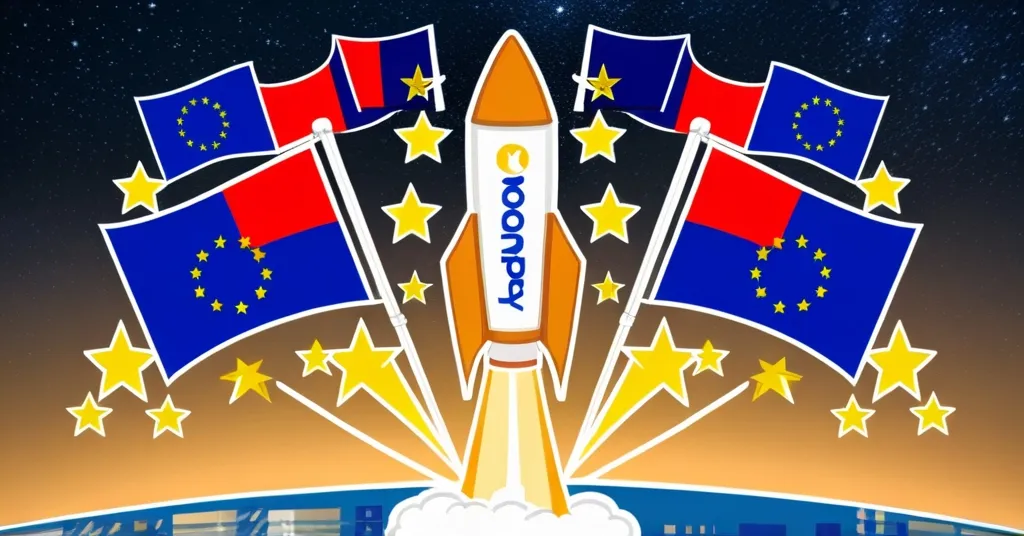MoonPay Secures MiCA License from Dutch AFM, Eyes EU Expansion

MoonPay Blasts Off into the EU Market with Groundbreaking MiCA Approval
MoonPay, a leading crypto payments platform, has secured a MiCA license from the Dutch Authority for the Financial Markets (AFM), marking a significant milestone in its expansion across Europe. The EU’s new crypto regulation, known as the Markets in Crypto-Assets (MiCA), aims to provide a unified legal framework for digital assets, with full implementation set for December 30, 2024. This move not only positions MoonPay for broader market growth but also underscores the company’s commitment to regulatory compliance and innovation.
- MoonPay secures MiCA license from the Dutch AFM.
- MiCA provides a regulatory framework for crypto in the EU.
- Full implementation of MiCA set for December 30, 2024.
- MoonPay can now expand its services across Europe.
What is MiCA?
MiCA, or Markets in Crypto-Assets, is the European Union’s new regulatory framework designed to standardize the regulation of digital assets across the European Economic Area (EEA), which includes all 27 EU countries plus Iceland, Liechtenstein, and Norway. The key objectives of MiCA are to prevent money laundering, protect users, and promote innovation and market stability. With a full implementation date set for December 30, 2024, MiCA represents a significant step towards a more regulated and secure crypto environment in Europe.
MoonPay’s Strategic Move
MoonPay’s acquisition of a MiCA license from the Dutch AFM not only allows for its expansion across Europe but also showcases its dedication to navigating the evolving regulatory landscape. Ivan Soto-Wright, MoonPay’s co-founder and CEO, highlighted the significance of this achievement, stating:
“This approval is a testament to MoonPay’s proactive approach to regulation and our commitment to building a trusted bridge between the traditional financial world and the rapidly evolving crypto ecosystem.”
He further emphasized the company’s role in embracing the new regulatory framework:
“MiCA represents a pivotal moment for the European digital asset industry, and we’re proud to have worked collaboratively with the Dutch AFM to be among the first to embrace this new regulatory framework.”
MoonPay offers a range of services including crypto payments, buying, trading, and selling through various payment methods such as Venmo, PayPal, Apple Pay, debit and credit cards, and bank transfers. With the MiCA license, these services can now be seamlessly provided across Europe, enhancing user access to crypto services while ensuring a higher level of regulatory oversight and security.
Impact on Users
For users, MoonPay’s expansion under the MiCA framework means greater access to crypto services across the European Economic Area. This move is set to enhance the security and compliance of transactions, offering users peace of mind as they engage with cryptocurrencies. As MoonPay isn’t just paying the moon, they’re shooting for regulatory stars too, ensuring that users benefit from a more regulated and trustworthy crypto environment.
Broader Implications for Crypto in Europe
The European Securities and Markets Authority (ESMA) is working on a consistent regulatory approach to ensure smooth transitions leading up to MiCA’s full implementation. MoonPay’s early compliance sets a precedent for other crypto service providers, positioning the company as a leader in the space. As the crypto industry continues to evolve, this regulatory clarity from the EU fosters trust and stability in the market, paving the way for increased adoption and innovation.
However, it’s not all sunshine and rainbows. MoonPay’s journey under MiCA might face challenges such as adapting to different national interpretations within the EU. While the framework aims for uniformity, regional variations could still pose hurdles. Moreover, as Bitcoin maximalists might argue, while regulatory clarity is a step forward, the focus should remain on the decentralized ethos of cryptocurrencies, ensuring that compliance doesn’t stifle the very innovation MiCA seeks to promote.
Future of Crypto Regulation
Looking beyond MiCA, the future of crypto regulation may involve further harmonization across global markets. MoonPay’s proactive stance on regulation could influence these developments, potentially shaping the regulatory landscape in other regions as well. As we champion decentralization and privacy, it’s crucial to monitor how these regulations evolve, ensuring they align with the principles of freedom and effective accelerationism (e/acc) while fostering responsible growth in the crypto space.
While altcoins and other blockchains like Ethereum play significant roles in the financial revolution, Bitcoin remains the cornerstone. MoonPay’s move under MiCA not only facilitates broader access to various cryptocurrencies but also underscores the importance of Bitcoin as the leading decentralized currency. Balancing regulatory compliance with the disruptive potential of Bitcoin and other digital assets will be key to the future of finance.
Key Questions and Takeaways
- What is MiCA and what are its key targets?
MiCA, or the EU’s Markets in Crypto-Assets regulation, aims to provide a unified legal framework for crypto assets. Its key targets include preventing money laundering, protecting users, and supporting innovation and market stability.
- When will MiCA be fully implemented?
MiCA will be fully implemented on December 30, 2024.
- How does MoonPay’s MiCA license impact its operations?
MoonPay’s MiCA license allows it to expand its services across Europe, offering crypto payments, buying, trading, and selling through various payment methods under the new regulatory framework.
- Why is MoonPay’s regulatory approval significant?
MoonPay’s regulatory approval is significant because it demonstrates the company’s proactive approach to regulation and positions it as a trusted bridge between traditional finance and the crypto ecosystem, facilitating expansion and compliance with EU standards.



